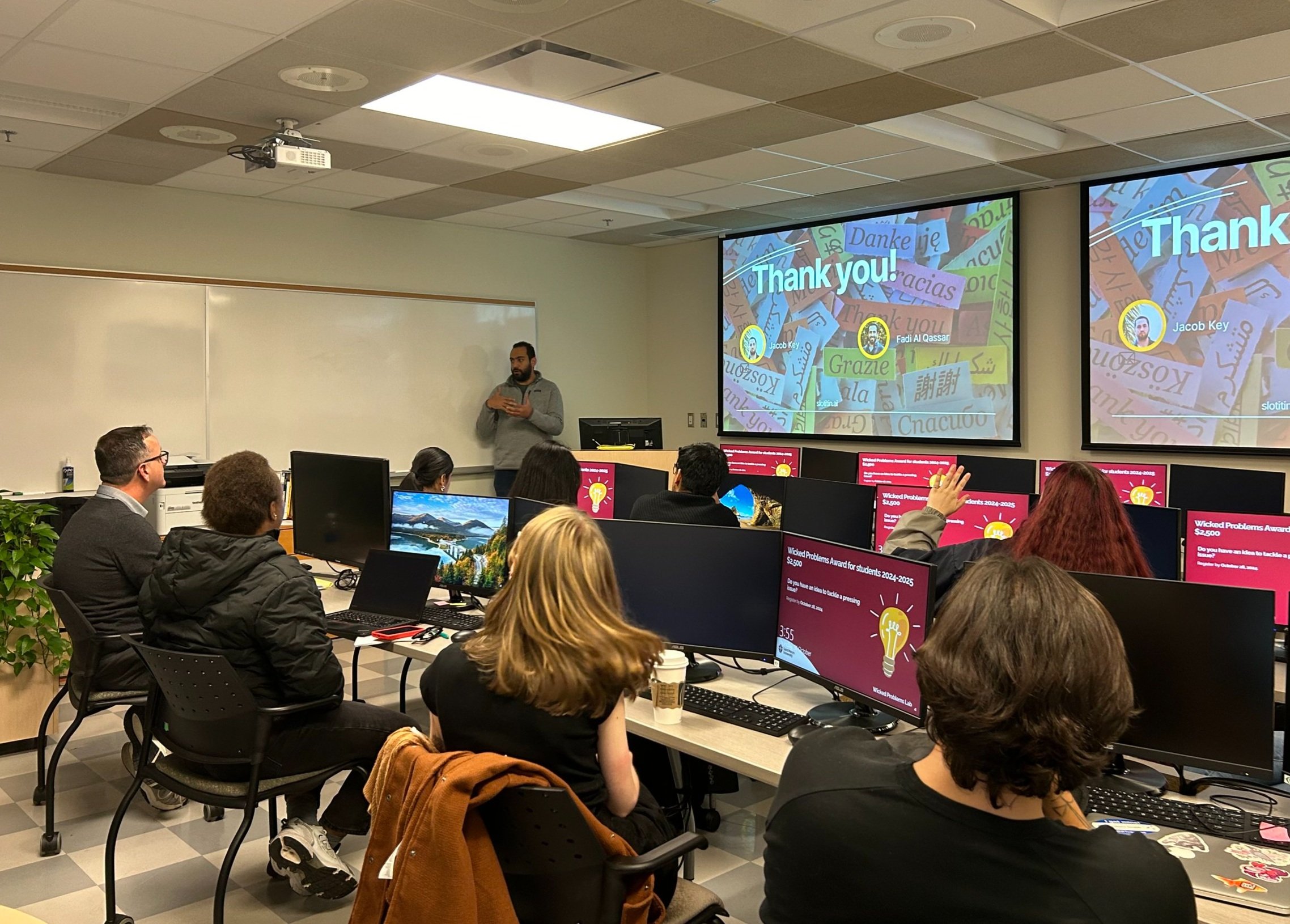




The third edition of the Wicked Problems Competition, sponsored by SMU alumnus Douglas Coll BComm’89, awarded $2,500 each to two outstanding undergraduate projects for their innovative solutions to complex challenges. The Wicked Problems Lab also funded an additional award for a graduate student.
“Wicked problems, like food insecurity or pollution, are considered nearly impossible to solve. They are complex, constantly evolving, and lack a definitive endpoint,” explains Dr. Mathew Novak, professor in the Department of Geography and Environmental Studies and director of the Wicked Problems Lab (WPL). “These awards inspire students to think creatively and work toward solutions that make a difference.”
This year’s competition (2024–2025) showcased twelve remarkable project ideas addressing sustainability, health, pollution, food waste, transportation, and housing challenges.
The winning projects:
Science/Chemical Engineering student Sheheryar Khan proposed developing a seaweed-based bioplastic that decomposes naturally within a year, offering a sustainable alternative to traditional plastics.
BComm students Rebbeca Hill and Alyssa MacDonald proposed producing smoothies using cosmetically imperfect fruits and vegetables from the Annapolis Valley, promoting local sourcing and sustainability as well as reducing food waste.
Graduate student Erin Norris (Applied Health Services Research) proposed Group Music Therapy as a proactive intervention for autistic students, aiming to reduce stress and improve social connectedness.
The winners can collaborate with Dr. Novak and Dr. Patricia Matsumoto–the WPL’s Research Analyst–, to develop their projects. The Wicked Problems Lab (AT 212) supports students by providing access to data, research contacts and analytical software. The students will present an update on their projects at the end of the Winter term, showcasing how their ideas are contributing to solving society’s most pressing issues.
Catching up with the 2024 winners
Melissa Alvarez Del Angel developed a project aimed at creating a healthier campus at SMU. She won the 2023-2024 Wicked Problems Lab competition with her pitch, “Palm Oil Reduction and Healthier Food on Campus”. Working alongside Wicked Problems Lab and Geography students Christina Connors and Maya Kosic, she helped map the campus vending machines, identifying what kinds of food and beverages are available and where they are located.
Melissa also conducted a food survey in collaboration with another 2023-2034 student winner, Lydia Lee, to gather feedback from students, staff, faculty, and the wider SMU community about food options on campus.
The survey revealed that over 80% of respondents were interested or might be interested in healthier vending machine options, such as fruits, vegetables, cereal bars, and natural juices. Respondents shared additional concerns, including:
The need for more variety and year-round food options, as some staff and students remain on campus even during breaks when availability is limited.
A preference for locally sourced options, like a local coffee shop.
An emphasis on allergy labeling and clear ingredient lists.
Requests for more culturally inclusive food options, not just in dining halls and cafés but also in the food bank, as international students are among those facing food insecurity.
In addition to developing her Wicked Problems Lab project, Melissa has advocated for wellness at SMU and wrote an article for the SMU Journal highlighting why students should care about palm oil consumption. As the editor of the SMU Journal, Melissa also worked on publishing an article about SMU Dockside dining.
Melissa’s project concluded that SMU’s community values wellness and inclusive food options. Her work not only raised awareness but also highlighted areas for improvement. She remains committed to advocating for a healthier campus and has made a meaningful difference for the SMU community.
Lydia Lee developed the project “Sustainable Seconds”, focused on addressing food insecurity by creating affordable and sustainable home meal kits. These kits used surplus produce from local farmers and donated ingredients, offering a cost-effective solution with pre-measured ingredients and easy-to-follow recipes.
Through her project, Lydia found that nearly 57% of students were moderately or severely food insecure and had to skip a meal a couple of times per week because of the price. She also discovered that students wanted more affordable and healthier food options. Lydia worked with the Wicked Problems Lab and her network to connect with local producers and project partners. She ran a campaign to collect donated non-perishable goods and surplus produce.
Her efforts resulted in the delivery of over 1,000 pounds of food through Sustainable Seconds meal kits to students at SMU and Dalhousie. This project not only provided immediate help to those in need but also promoted sustainability by reducing food waste.
Lydia’s project demonstrates how practical solutions and collaboration can have a real impact on addressing food insecurity.


